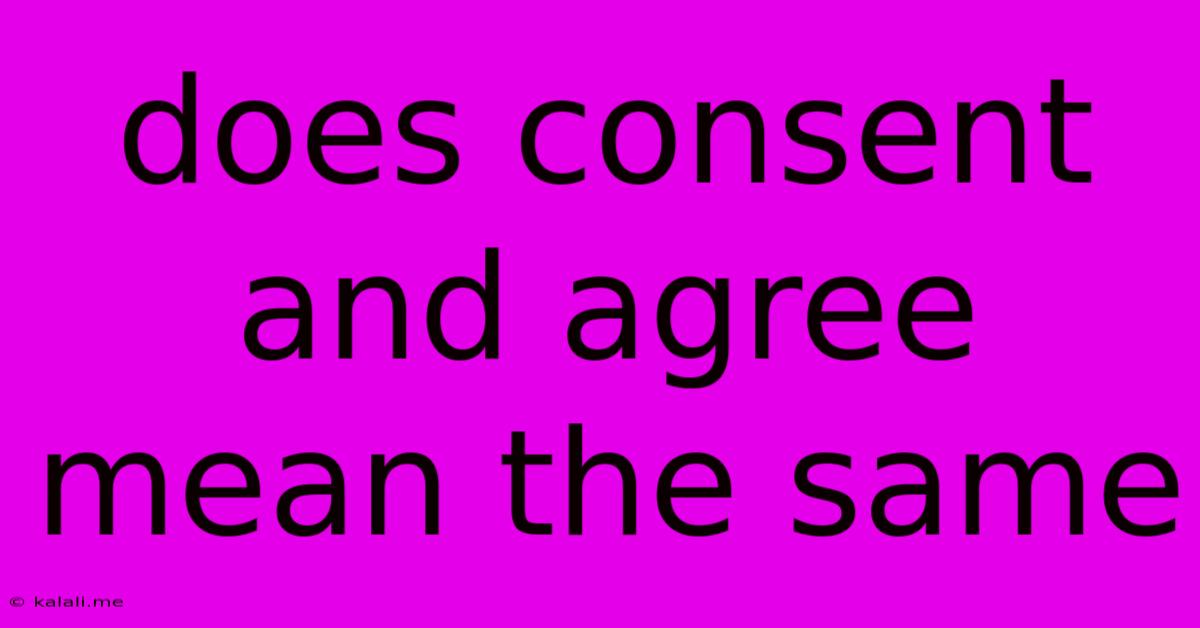Does Consent And Agree Mean The Same
Kalali
May 30, 2025 · 3 min read

Table of Contents
Does Consent and Agree Mean the Same Thing? A Deeper Look at Legal and Everyday Usage
Consent and agreement are often used interchangeably in everyday conversation, but in legal and formal contexts, they hold distinct meanings. While there's overlap, understanding their nuances is crucial, particularly in situations involving significant implications like contracts, medical procedures, or sexual activity. This article delves into the key differences between consent and agreement, exploring their practical applications and legal ramifications.
What is Consent?
Consent, in its simplest form, means giving permission or approval. It's an act of freely choosing to participate in something. Importantly, consent can be withdrawn at any time. The crucial element is the absence of coercion, duress, or undue influence. True consent requires a clear understanding of what is being consented to, with the capacity to make an informed decision.
- Key Characteristics of Consent:
- Voluntary: Given freely without pressure or manipulation.
- Informed: Based on a full understanding of the implications.
- Enthusiastic: Not merely passive acquiescence but active agreement.
- Revocable: Can be withdrawn at any point.
What is Agreement?
Agreement, on the other hand, signifies a mutual understanding or accord between two or more parties. It often involves a formal or informal contract, establishing mutual obligations and responsibilities. While agreement often implies consent, it doesn't always guarantee it. A person might agree to something under duress, or without fully understanding the implications, rendering the agreement invalid or unenforceable.
- Key Characteristics of Agreement:
- Mutual understanding: Both parties share a common understanding of the terms.
- Offer and acceptance: One party makes an offer, and the other accepts.
- Consideration: Something of value is exchanged. (This is particularly relevant in legal contracts).
- Capacity: Both parties must have the legal capacity to enter into an agreement.
The Crucial Differences: Consent vs. Agreement
The primary difference lies in the power dynamic and the level of understanding. Consent focuses on the individual's autonomy and freedom to choose, whereas agreement emphasizes mutual understanding and obligations.
-
Scenario 1: Medical Procedure – A patient's consent to a medical procedure is essential. The doctor must ensure the patient understands the procedure, its risks, and alternative options. Simply agreeing to the procedure isn't sufficient if the consent wasn't freely given and informed.
-
Scenario 2: Contractual Agreement – Signing a contract represents an agreement, but it doesn't automatically mean consent to every term. A party might agree to terms under pressure or without fully understanding them, potentially leading to challenges later.
Consent in Specific Contexts:
The concept of consent holds particular significance in sensitive areas, such as:
- Sexual Activity: Consent is absolutely crucial and must be freely given, enthusiastic, and ongoing. Silence or lack of resistance does not equal consent.
- Data Privacy: Users must consent to the collection and use of their personal data. This often involves checking boxes and agreeing to terms of service, but true consent requires clear and understandable information about data handling practices.
In Conclusion:
While consent and agreement share some overlap, they're not interchangeable. Consent emphasizes individual autonomy and freedom of choice, while agreement focuses on mutual understanding and obligations. Understanding the nuances between these terms is vital in various contexts, especially where legal implications are involved. Always prioritize informed, voluntary, and enthusiastic consent, ensuring that agreements are fair and equitable for all parties.
Latest Posts
Latest Posts
-
How To Orthogonally Diagonalize A Matrix
May 31, 2025
-
Is Anatomy Of A Fall In French
May 31, 2025
-
Will Touching The Negative And Postivite Terminal Kill You
May 31, 2025
-
How Do You Tell What Key A Song Is In
May 31, 2025
-
How To Add App To Home Screen Android
May 31, 2025
Related Post
Thank you for visiting our website which covers about Does Consent And Agree Mean The Same . We hope the information provided has been useful to you. Feel free to contact us if you have any questions or need further assistance. See you next time and don't miss to bookmark.